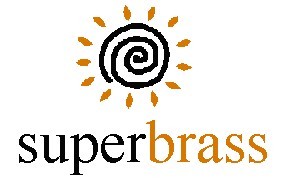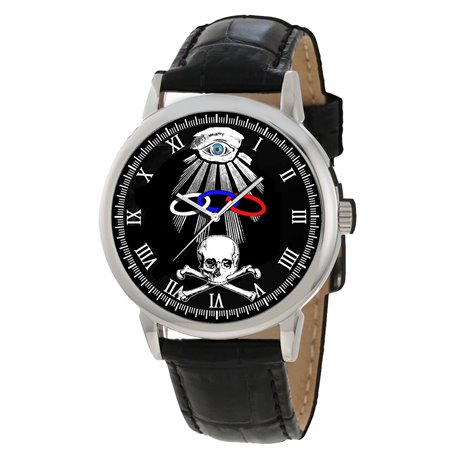No products
Associations & Fraternities
New products
-

Vintage Star Wars Darth Vader Metallic Black & Gold Titanium Finish Brass Watch
impressive 40 mm solid brass casing with stainless steel back premium...
$ 144.26 -

Mickey Mouse by Damien Hirst, Provocative Neo Pop Art Solid Brass Watch
40 mm solid brass casing Premium Citizen 2040 quartz movement. Unique...
$ 144.26 -

Red Cross of Constantine, Maltese Cross, Vintage Art Solid Brass Collectible Watch
40 mm solid brass casing Premium Citizen 2040 quartz movement. Unique...
$ 118.18 -

Red Cross of Constantine, Maltese Cross, Vintage Art Solid Copper Collectible Watch
40 mm solid copper casing Premium Citizen 2040 quartz movement. Unique...
$ 134.48 -

Japanese Cranes, Peace, Luck & Longevity, Symbolic Solid Brass Collectible Watch
40 mm solid brass casing Premium Citizen 2040 quartz movement. Unique...
$ 118.18
The Odd Fellows Oddfellows Classic Symbolic Skull Art Gents Wrist Watch
WAT-042b
New product
38 mm with premium Citizen 2030 quatrz movement.
More info
The name Oddfellows refers to a number of friendly societies and fraternal organisations operating in the United Kingdom. It also refers to a number of Lodges with histories dating back to the 18th century.[1][2] These various organisations were set up to protect and care for their members and communities at a time when there was no welfare state,trade unions or National Health Service. The aim was (and still is) to provide help to members and communities when they need it. The friendly societies are non-profit mutualorganisations owned by their members. All income is passed back to the members in the form of services and benefits.
The Oddfellows are also fundraisers for both local and national charities; branches (lodges) raise money for local causes, and the Societies as a whole raise significant amounts for charities.
Fraternal societies and Guilds
The Oddfellows are one of the earliest and oldest Friendly Societies, but their early history is obscure and largely undocumented. There have been legends tracing their origins back to the exile of the Israelites in Babylon in the sixth century BC,[1] and claims that the order was brought to Europe by Jewish prisoners, after the destruction of the temple atJerusalem by the Roman Emperor Titus in AD 70.[citation needed] The legends go on to claim that "an Order of Odd Fellows was established in 1452 by knights who were said to have met at the Boulogne-sur-Mer in London and formed a fraternity".
Although these legends are at best, dubious, the evolution from the Guilds is more reliably documented. By the 13th century, the tradesmen's Guilds had become established and prosperous. During the 14th Century, with the growth of trade, the guild "Masters" moved to protect their power (and wealth) by restricting access to the Guilds. In response, the less experienced (and less wealthy) "Fellows" set up their own rival Guilds.
The Odd Fellows
The name "Odd Fellows" arose because, in smaller towns and villages, there were too few Fellows[clarification needed] in the same trade to form a local Guild.[citation needed] The Fellows from a number of trades therefore joined together to form a local Guild of Fellows from an assortment of different trades, the Odd Fellows.
During the following centuries, the idea of common people working together to improve their situation met with opposition (and persecution) from the upper classes, who saw them possibly as a source of revenue (taxes) but also as a threat to their power. For example, when the English King Henry VIII broke with the Roman Catholic Church, the Guilds were viewed by him as supporting the Pope, and in 1545 he confiscated all material property of the Guilds. Queen Elizabeth I took from the Guilds the responsibility for training apprentices, and by the end of her reign, most Guilds had been suppressed.
The Oddfellows Lodge
The elimination of the Trade Guilds removed an important form of social and financial support from ordinary working people. In major cities like London, some Guilds (e.g. the "Free Masons" and the "Odd Fellows") survived by adapting their roles to a social support function. Both of these had their base in London, but had established branches (called 'Lodges') across the country.[1]
The earliest surviving records of an Oddfellows Lodge is the manuscript of the rules, dated 1748, of the Loyal Aristarcus Lodge No.9 which met in inns in the Southwark, Hatton Garden and Smithfield areas of London[6] Many pubs in Britain are named 'The Oddfellows' or 'Oddfellows Arms', probably because they were once meeting places of Lodges.
The French Revolution caused "the establishment" to view organisations such as the Oddfellows and Freemasons with fear. Membership became a criminal offence in France, and such organisations were driven underground and forced to use codes, passwords, special handshakes and similar mechanisms.[1] Fear of revolution was not the sole reason for persecution; Friendly Societies like the Oddfellows were the predecessors of modern-day trade unions and could facilitate effective local strike action by levying all of their members for additional contributions for their benevolent funds, out of which payments could be made to the families of members who were on strike.[1][7]
The Oddfellows subsequently introduced a number of novel benefits for members. These included the Travel Warrant, which allowed members seeking work to stay overnight in an Oddfellows Hall, anywhere in the country, free of charge. The Oddfellows also introduced standard protection policies, sometimes called "tables" because each type of policy had its own numbered table of premium rates. People could subscribe to protect themselves financially. In the United Kingdom at that time, until 1948, payment was required to see a doctor or to go into hospital. Many people therefore joined friendly societies like the Oddfellows to obtain financial protection to meet these costs.
Evolution
As a result of the Glorious Revolution of 1688, (when the Protestant William of Orange replaced the Catholic King James II), in the mid-18th century the Oddfellows split into The Order of Patriotic Oddfellows (based in the south of England and supporting William)[9] and The Ancient Order of Oddfellows (based in the north and favouring the Stuarts).
The Grand United Order of Oddfellows
Subsequent to the failure of Bonnie Prince Charlie's uprising, in 1789 the two Orders formed a partial amalgamation as the Grand United Order of Oddfellows. These days they are more commonly known as "The Grand United Order of Oddfellows Friendly Society" (GUOOFS)
The Independent Order - Manchester Unity

In 1810, members of the Oddfellows in Manchester area became dissatisfied with the way the Grand United Order was being run and formed an independent Order with the title 'Manchester Unity'. This organisation is now referred to as "The Independent Order of Oddfellows (Manchester Unity)", or more simply, "The Manchester Unity Order of Odd Fellows" (MUOOF).
According to Manchester Unity literature: "With their improved organisation and rules, they encouraged many other lodges across the country to leave the old Grand United Order and join the Independent Order under the 'Manchester Compliance'.[1]
Subsequent breakaways [edit]
Subsequent breakaways from the parent Grand United Order and from the new Manchester Unity Order resulted in the formation of further Orders of Odd Fellows. In the case of the parent Order, various lodges seceded in 1832 to found the Ancient & Noble (Bolton Unity), which subsequently dissolved in 1962, and in the case of the new Order, the Nottingham Odd Fellows.
The Grand United Order of Oddfellows (Sheffield Unity) was formed in an early breakaway from the Manchester Unity. The Ancient Noble Order of Oddfellows (Bolton Unity) was formed from the Sheffield Unity in 1832. The Nottingham Ancient Imperial Order of Oddfellows was formed from the Sheffield Unity in 1812. The Improved Independent Order of Oddfellows (London Unity) was formed from the Manchester Unity around 1820. The British United Order of Oddfellows was formed from the Imperial Nottingham Order in 1867.
The Albion Order of Oddfellows was formed from the Manchester Unity in 1831. Several other secessions then occurred to form the Nottingham Independent Order, the Derby Midland Order, the Ilkison Unity [Ilkeston?] and the Norfolk and Norwich Unity. The Kent Unity was formed in 1805; its first Lodge, however, was not formed until 1861.
The Kingston Unity of Oddfellows was formed from the Manchester Unity in 1840, and the National Independent Order was formed from the Manchester Unity in 1846. There was an East Anglia Unity; a few items of their regalia and jewels are in the museum at Freemasons' Hall in London.
The Wolverhampton Unity of Oddfellows ceased to exist in 1876 when it merged with the Ancient Order of Shepherds.
The American Separation
The Oddfellows had spread to America in the late 18th century, and several unofficial lodges existed in New York City; but American Odd Fellowship is regarded as being founded in Baltimore in 1819, by Thomas Wildey, and the following year affiliated with the Manchester Unity.[1]
In Britain in 1834, the Tolpuddle Martyrs were unexpectedly convicted and transported for "membership of an illegal friendly society". The Oddfellows "Board of Directors" hastily modified the "constitution" to evade a similar fate.
Members of the Oddfellows in the United States were not pleased to see the ancient rituals changed without their agreement, particularly to satisfy a British Government against which they had fought a war of independence. As a result, the Oddfellows in America declared their independence from the Manchester Unity of Oddfellows and became a self-governing Order – the Independent Order of Odd Fellows – which established lodges across the world (and continues to this day).
Legitimacy
The Oddfellows continued to be viewed with suspicion by "the establishment". At various times, right up to 1850, some aspects of the Orders' practices were declared illegal. However, by 1850, the Independent Order of Oddfellows Manchester Unity Friendly Society had become the largest and richest friendly society in Britain. This growth was spurred by the growth caused by the Industrial Revolution, the lack of Trade Unions, and the lack of personal or public insurance; only by joining mutual friendly societies like the Oddfellows could ordinary people protect themselves and their families against illness, injury or death.[1]
In 1911, when Asquith's Liberal government was setting up the National Insurance Act in Britain, the Oddfellows protected so many people that the government used the Oddfellows' actuarial tables to work out the level of contribution and payment required. At that time the Oddfellows was the largest friendly society in the world.
The Welfare State and modern Oddfellows
The Welfare State and the National Health Service took over the major part of the role of Friendly Societies, and since 1948 the role of the Oddfellows has evolved in other directions, with a continuing focus on social involvement, care & support, and financial benefits.[1]
In the second half of the 20th century, the Oddfellows moved into financial products.
The international spread of Oddfellowship
The concept of the Oddfellows was taken abroad as members emigrated to the far-flung corners of the Commonwealth and to the New World. Today, the Oddfellows can be found in many countries across the world, including Australia, New Zealand, South Africa and the West Indies. The American Order has set up lodges in Canada, Germany, Iceland, Denmark, Belgium, Finland, Holland and many other European countries. In Asia, the Oddfellows was revived when lodges were re-established in the Philippines in 2009.
A revival of the procedures followed by the oldest ascertained Oddfellows' unit, the "Loyal Aristarcus Lodge" in London (1730–40), was started in 2010 by a group of Italian Oddfellows, led by Masonic author Michele Moramarco.
Notable members of the Oddfellows
- George IV, King of United Kingdom (1820–1830)
- Levi and Matilda Stanley, considered as King and Queen of the Gypsies
- Winston Churchill, Wartime Prime Minister of United Kingdom
- John Wilkes, English radical, journalist and politician.
- Sir George Savile, 8th Baronet, English politician.
- Stanley Baldwin, Prime Minister of United Kingdom (1923–1924, 1924–1929, 1935–1937)
- The fathers of George Harrison and Ringo Starr, members of The Beatles
Reviews
No customer reviews for the moment.




